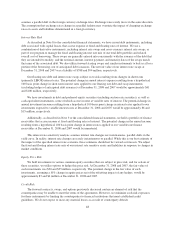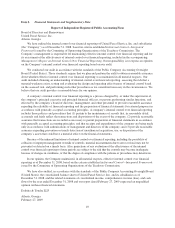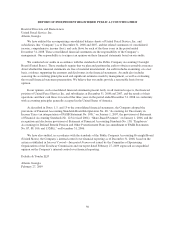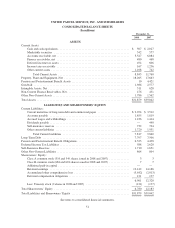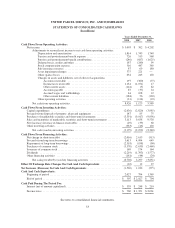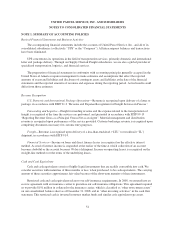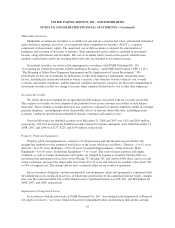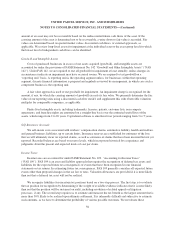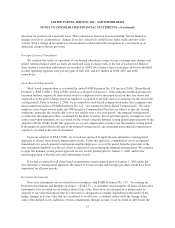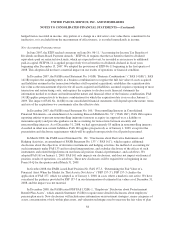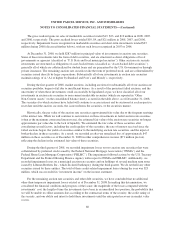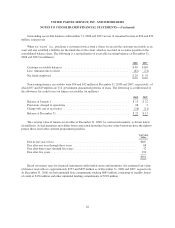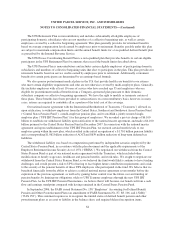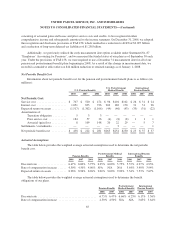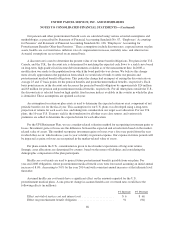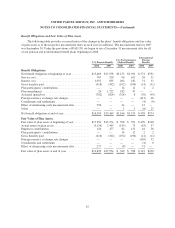UPS 2008 Annual Report Download - page 68
Download and view the complete annual report
Please find page 68 of the 2008 UPS annual report below. You can navigate through the pages in the report by either clicking on the pages listed below, or by using the keyword search tool below to find specific information within the annual report.UNITED PARCEL SERVICE, INC. AND SUBSIDIARIES
NOTES TO CONSOLIDATED FINANCIAL STATEMENTS—(Continued)
uncertain tax positions on a quarterly basis. This evaluation is based on factors including, but not limited to,
changes in facts or circumstances, changes in tax law, effectively settled issues under audit, and new audit
activity. Such a change in recognition or measurement would result in the recognition of a tax benefit or an
additional charge to the tax provision.
Foreign Currency Translation
We translate the results of operations of our foreign subsidiaries using average exchange rates during each
period, whereas balance sheet accounts are translated using exchange rates at the end of each period. Balance
sheet currency translation adjustments are recorded in AOCI. Net currency transaction gains and losses included
in other operating expenses were pre-tax gains of $46, $26, and $23 million in 2008, 2007 and 2006,
respectively.
Stock-Based Compensation
Stock-based compensation is accounted for under FASB Statement No. 123 (revised 2004), “Share-Based
Payment” (“FAS 123(R)”). FAS 123(R), which was adopted on January 1, 2006 using the modified-prospective
transition method, requires all share-based awards to employees to be measured based on their fair values and
expensed over the period during which an employee is required to provide service in exchange for the award (the
vesting period). Prior to January 1, 2006, we accounted for stock-based compensation under the recognition and
measurement provisions of FASB Statement No. 123, “Accounting for Stock-Based Compensation”. We issue
employee share-based awards under the UPS Incentive Compensation Plan that are subject to specific vesting
conditions; generally, the awards cliff vest or vest ratably over a five year period, “the nominal vesting period,”
or at the date the employee retires (as defined by the plan), if earlier. For awards that specify an employee vests
in the award upon retirement, we accounted for the awards using the nominal vesting period approach prior to the
adoption of FAS 123(R). Under this approach, we record compensation expense over the nominal vesting period.
If the employee retires before the end of the nominal vesting period, any remaining unrecognized compensation
expense is recorded at the date of retirement.
Upon our adoption of FAS 123(R), we revised our approach to apply the non-substantive vesting period
approach to all new share-based compensation awards. Under this approach, compensation cost is recognized
immediately for awards granted to retirement-eligible employees, or over the period from the grant date to the
date retirement eligibility is achieved, if that is expected to occur during the nominal vesting period. We continue
to apply the nominal vesting period approach for any awards granted prior to January 1, 2006, and for the
remaining portion of the then unvested outstanding awards.
If we had accounted for all share-based compensation awards granted prior to January 1, 2006 under the
non-substantive vesting period approach, the impact to our net income and earnings per share would have been
immaterial for all prior periods.
Derivative Instruments
Derivative instruments are accounted for in accordance with FASB Statement No. 133, “Accounting for
Derivative Instruments and Hedging Activities” (“FAS 133”), as amended, which requires all financial derivative
instruments to be recorded on our balance sheet at fair value. Derivatives not designated as hedges must be
adjusted to fair value through income. If a derivative is designated as a hedge, depending on the nature of the
hedge, changes in its fair value that are considered to be effective, as defined, either offset the change in fair
value of the hedged assets, liabilities, or firm commitments through income, or are recorded in AOCI until the
57



